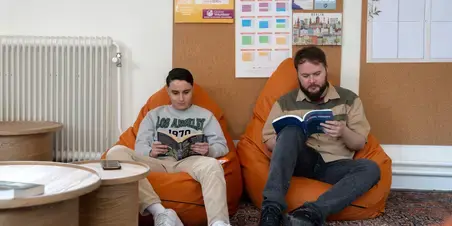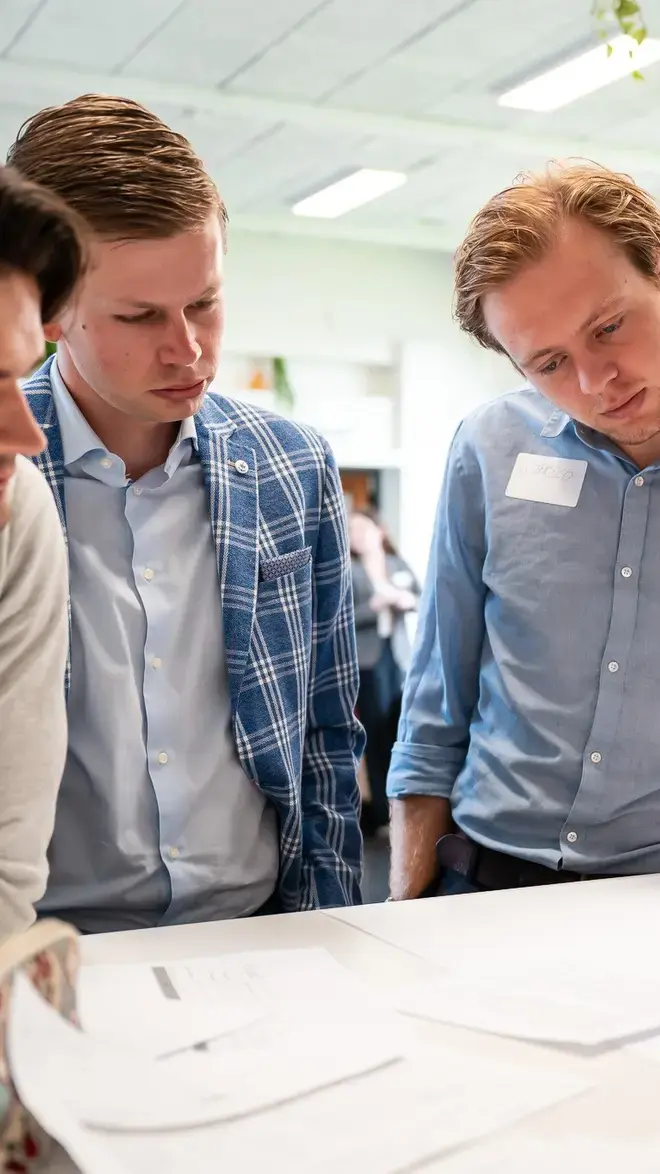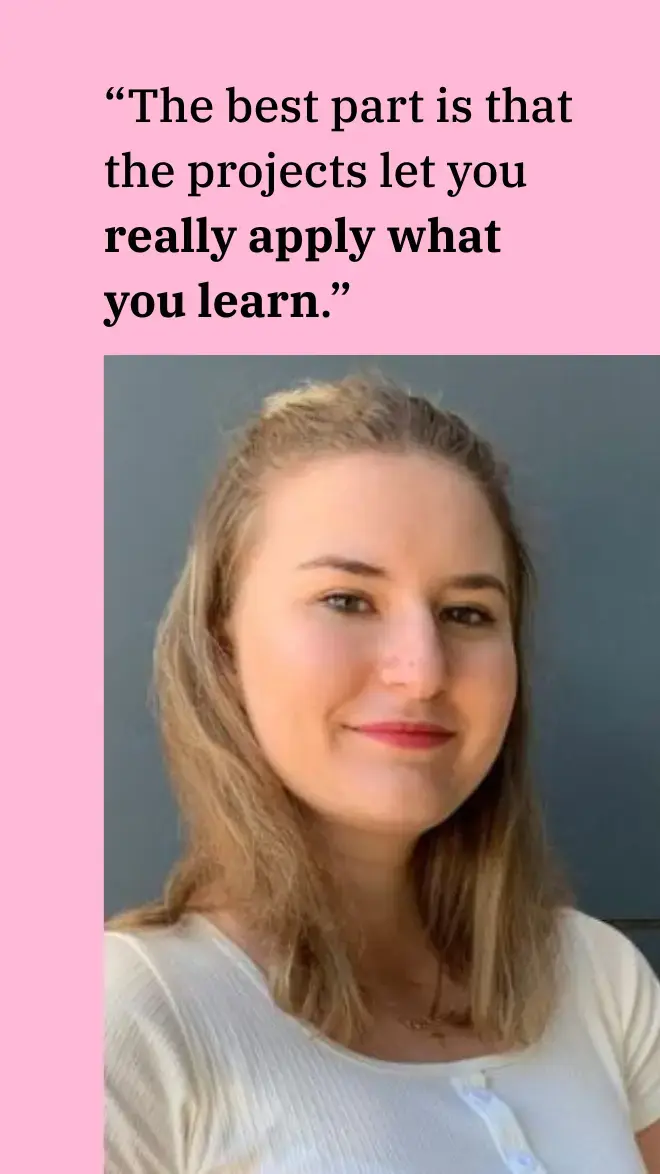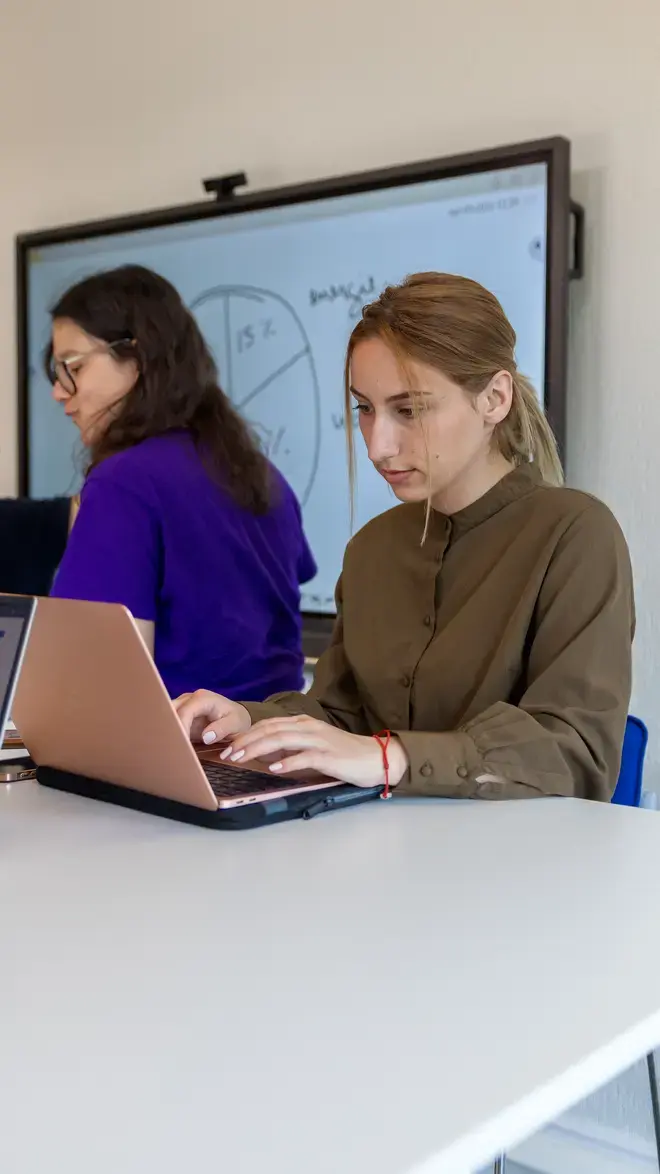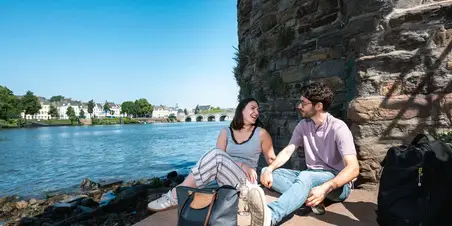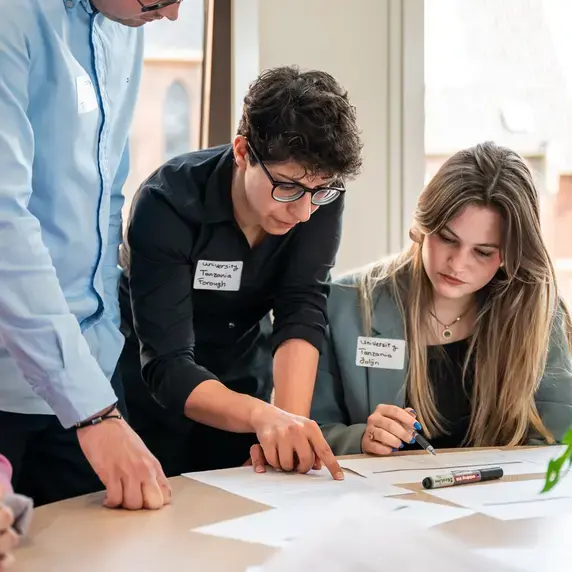
In short
Are you ready to make a positive change in Europe? Combine your interest in the EU, love of foreign countries and talent for cooperation in the English-taught HBO bachelor European Studies. You’ll gather knowledge and skills needed to tackle societal challenges in Europe.
We’ll teach you about policymaking, European bodies, the political field and how international cooperation works in the European Union. What you learn will be directly applied in projects, which will help you gain more experience. You will also study German, French or Spanish and different cultures throughout your studies. You will also do an internship and complete part of your European Studies degree abroad. This will prepare you for an international career where you can start making a difference.
Join our Open Day
Ask all your questions, soak up the atmosphere and experience what it’s like to study here. Whether you already know what you want or are still deciding, discover what truly suits you during the open day.
Try an Experience Day?
Experience a programme from the inside. During an experience day, you’ll follow a schedule together with other prospective students.
Download the programme brochure
Everything about the programme content, admission, internships and future opportunities, all in one clear document.
Why study European Studies at Zuyd?
-
Studying in an international community
You study with students from many different countries and cultures. Together you learn what it means to work in an international environment, literally and figuratively broadening your horizons
-
Learn how to make impact from day 1
You’ll get to work straight away on real projects about current European issues. This way, you learn both theory and practice while developing skills such as teamwork, critical thinking and communication.
-
International experience
Internship, projects and an exchange semester: international experience is a core part of your studies. You’ll build a CV that will make both employers and yourself happy.
-
Learning an extra language = extra opportunity
In addition to English, you’ll learn another foreign language such as Spanish, French or German. This not only broadens your worldview but also increases your chances of an international career.
-
Small-scale, personal approach
You know your lecturers by name – and they know you. The atmosphere is open and supportive, and everyone helps each other. This way, you grow not only as a student but also as a person.
Study in the student city of Maastricht
At our building on Brusselseweg 150 in Maastricht, you’ll find a welcoming, cosy atmosphere. There’s plenty of space to work together on projects, but also to relax in the community room, maybe with a game of table football. The building combines a cool mix of vintage and modern style, with lots of plants.
Students and lecturers of European Studies come from all over the world, so you’ll hear many different languages here, not just English, but also French, Bulgarian, Spanish, Portuguese, and more. Just like Maastricht itself, our building is truly an international environment.
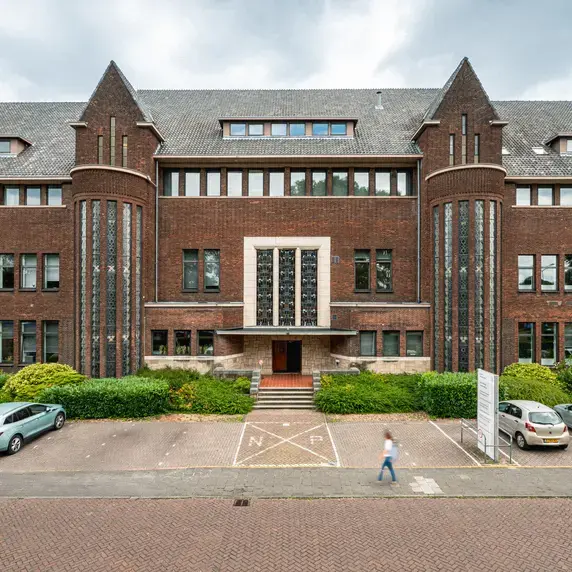
We are Zuyd. We are close-knit, sincere and confident
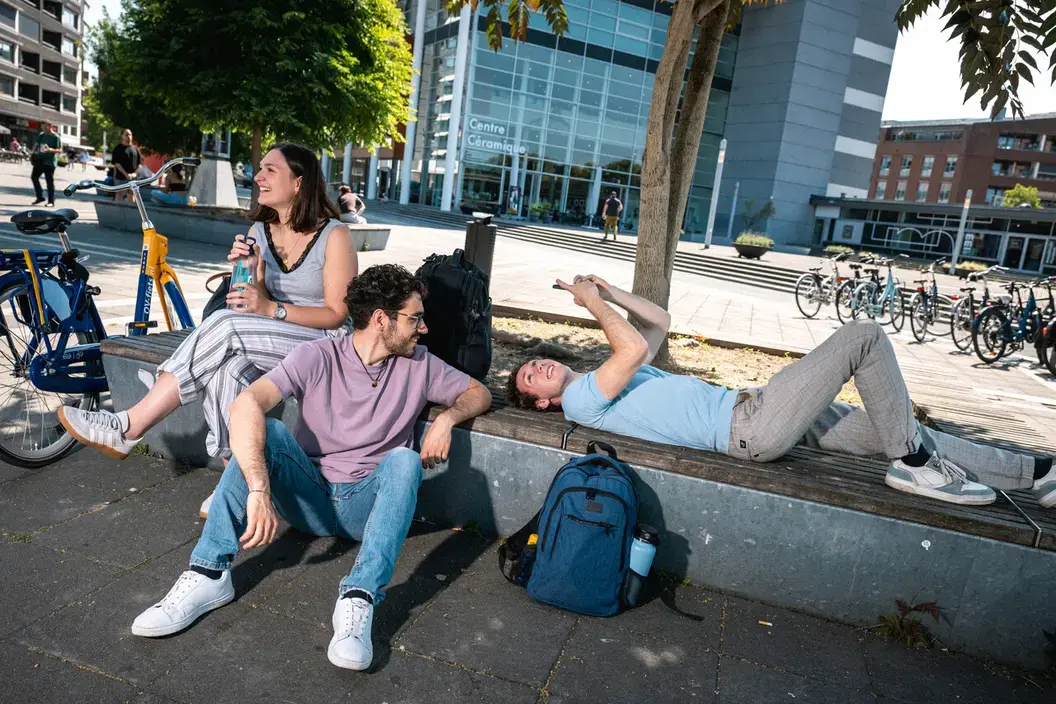
Programme Structure
You start at European Studies with a broad view, explore the field and have every opportunity to develop yourself. Lecturers and mentors are by your side at every stage of your studies. From your first lecture to your internship: you’re never on your own.
Your first year
The European Studies HBO programme in Maastricht is designed with your future career in mind. Much of the theory you learn is immediately applied in practical assignments that you work on together with students from many different countries. For example, you might give policy advice to make a city or company more sustainable or develop a strategy to secure government support for new innovations. You’ll also learn how to raise awareness of social issues, for instance, by working on a project to combat food waste.
By working on these projects, you’ll gain valuable practical experience and develop your ability to collaborate with people from different cultures. Each study block focuses on a specific profession you could pursue after graduation. There are many different career paths open to you. And even if you don’t yet know what you want to do after your European Studies bachelor, that’s completely fine. You’ll naturally discover what suits you best along the way. You’ll learn what you’re good at, what you enjoy, and which direction you’d like to take. At the same time, you’ll gain work experience and develop practical skills you can confidently apply in your future career.
In your first year, you’ll explore these professions:
- Communication Officer (for a City Council)
- Project Manager
- Lobbyist and Consultant
- Corporate Social Responsibility Policy Advisor
This way, you’ll get a real feel for what these roles involve and the skills you’ll need. You’ll also study a range of topics that prepare you to tackle societal challenges in Europe, so that you’re well-equipped for your future career.
The HBO Bachelor of European Studies is structured in 4 study blocks, each lasting 10 weeks, with each block centred around a specific theme. In the first year, we focus on the following themes for each block of study:
- Get to know Europe
You develop a public relations strategy for a city eager to win the title "European Capital of Culture". You will also organise a promotional event for that city where you will enhance its image. You do this by focusing on the city's unique cultural identity, its historical heritage, and innovative projects. - Cooperation in the EU
Countries bordering each other often work together to address common challenges. In this study block, you will develop a plan within such a collaboration. For example, you will work on a plan to prevent floods or promote greening of cities. - Lobbying in the EU
As a consultant, you provide lobbying advice to clients from the field on an EU legislative proposal. Suppose you work for an organisation that advocates equal rights for men and women in the workplace. As a lobbyist, you push to influence an EU law that ensures more female representation in senior positions. - Sustainability in business
You will make a sustainability recommendation for an organisation in transport, food, or energy. If a company has to choose between switching to electric company cars or offering allowances for public transport, you’ll be the one committed to determining which option is the most sustainable.
These subjects are in your schedule:
- EU / European Knowledge
You will learn exactly how the European Union and other European institutions work. You delve into what political and cultural events led to the formation of Europe. You will also discover how European institutions function, what types of regulations and directives they create, and how they affect our daily lives. You will also learn how EU decisions affect national and local governments, businesses, and society. - Intercultural communication
What do you do when someone from another culture responds in a way that’s completely different from what you’re used to? In this subject, you’ll learn how to recognise cultural differences and adapt your own communication. This will help you collaborate more effectively and truly understand one another. - English
European Studies is taught entirely in English. You will also have English classes where we focus on what you really need, such as professional writing or building clear arguments. This will allow you to work confidently in an international environment. - French, German or Spanish
Not only will you improve your English, but you will also learn French, German or Spanish. You can start as a beginner or at a slightly higher level. Besides the language, you will also learn about the culture of the countries where that language is spoken. If you choose German, for example, you will also discover what things are like in Austria and Switzerland. - Statistics
Statistics may sound complicated, but with us it is mainly about practical research skills. We start from scratch, so you don't need a maths degree. - Presentation skills
How do you make sure you stand confidently in front of a group and get your message across clearly? In this subject, you’ll learn how to present a project or point of view professionally. A skill you can use in any job! - Personal leadership
Being able to reflect properly helps you move forward. What are you good at, what can you improve on, and where do you want to go? Using theories, you will gain insight into your personal and professional development. This will help you build your future in a focused way.
In the European Studies programme, you are given the space to grow and discover new sides of yourself. This can be done, for example, by joining the language café, the debate club or participating in fun activities organised by the study association.
In each academic year, you can earn 60 credits. If you achieve all 60 credits of year 1, you will receive your propaedeutic certificate. Don't pass all subjects in the first year? Don't worry, you can always retake subjects the following year.
Advanced study and practical experience
Collaboration is an important part of studying at the European Studies bachelor. You’ll develop essential skills such as organising and planning projects, professional writing, presenting, and communicating with people from different cultures, often in multiple languages. Your lecturers and classmates come from all over the world, so you’ll get to put these international communication skills into practice right away. You’ll also go on field trips and language tours to places like Brussels and Strasbourg, giving you the chance to experience what life is like inside institutions such as the European Parliament.
In the second year of the Bachelor of European Studies you'll broaden your knowledge by working on the following themes:
- European competitiveness
You’ll write several opinion pieces on current topics such as AI, geopolitical tensions, and their impact on welfare. This will strengthen both your writing and critical thinking skills. - Democracy in Europe
You’ll create your own European political party, write a political manifesto, organise a debate, and represent your party during this debate. - EU in a globalised world
You’ll learn how international diplomacy works and take on the role of a diplomat for an EU member state. You’ll sit at the negotiation table and defend your country’s positions. - Civil society in Europe
In this block, you’ll develop a campaign to protect human rights in Europe on behalf of a non-governmental organisation like Amnesty International.
Just like in the first year, each study block focuses on a specific profession.
- Journalist & Regional Policy Maker
- Political Campaigner & Event Organiser
- Policy Analyst
- Communication Officer (for a Non-Governmental Organisation)
Year 3
In the third year of the Bachelor of European Studies, you’ll spend 6 months studying abroad at one of our partner colleges or universities. There, you’ll choose subjects you’d like to explore in more depth. You can study in almost any country, both within and outside Europe. Your studies are important, but so is the experience. You’ll live independently abroad, meet students from a wide range of cultures, communicate in different languages, and learn to stand on your own two feet.
In the second half of your third year, you and some fellow students will start your own consultancy in public affairs or public relations and work together on a research proposal.
The professions central to year 3 are:
- Exchange Student
- Public Affairs & Public Relations Consultant
- Project Manager & Researcher
Year 4
In the fourth year of our European Studies bachelor in the Netherlands, all the knowledge and skills you’ve gained come together as you complete your studies. You’ll choose a minor to specialise in a topic you want to explore further. This can be within European Studies bachelor in Maastricht or at another university of applied sciences. Possible topics include human rights, Central and Eastern Europe, counterterrorism, European development aid, or global competition.
Within the project groups, these professions will be your focus:
- Event Organiser & Policy Advisor
- Intern in an Organisation of Your Choice
You can also choose a pre-master’s minor, offered in collaboration with Maastricht University. In applied sciences, the focus is on practical research skills, while at university, the emphasis is more on theoretical research. The pre-master’s minor will prepare you well for the academic approach of a Master’s in just 10 weeks. After your bachelor's, this will allow you to progress to the master's in European Studies at Maastricht University. In the last semester of year 4, you’ll complete an internship.
Internships
At European Studies, you will gain many international experiences through studying in a diverse cultural environment, through study abroad opportunities and internships with prestigious institutions. In your third year, you’ll spend a semester studying at one of our 100+ partner universities across Europe and beyond, immersing yourself in a new culture while deepening your academic knowledge.
In the fourth year of your Western European Studies degree, you’ll complete a 5–6-month internship, working at internationally renowned organizations such as the European Parliament, embassies, NGOs, or intergovernmental bodies like the World Bank.
Our close partnerships with these institutions, alongside the guidance and support from Zuyd University of Applied Sciences, ensure that you’re well-prepared to apply for and succeed in these international placements. Whether studying abroad or completing an internship, we help you take your first steps toward a successful global career.
For a full list of exchange and internship partners, please refer to this document.
Guidance and support
From the moment you join European Studies, you’re not just a number – you’re part of a close-knit learning community. With small class sizes of around 20 students, our lecturers have the time and space to truly get to know you and support your individual progress.
Throughout your four-year European Studies journey, you’ll benefit from structured personal guidance tailored to each stage of your studies. This includes academic mentoring, career coaching, and regular project supervision, where lecturers guide your team through real-life assignments. You’ll have a dedicated mentor – a lecturer you meet with regularly to discuss your study progress, choices like internships or study abroad, and anything else that may impact your academic experience.
And if life gets challenging, you won’t face it alone. Our wellbeing services include study advisors and student psychologists who are here to listen and help when needed.
For those considering joining the European Studies bachelor, we also offer one-on-one study choice conversations. Whether you’d like to speak to a current student, a lecturer, or a study advisor, we’re happy to connect you. Just send an email to europeanstudies@zuyd.nl and we’ll help you take the first step.
Your first year
Your first year
The European Studies HBO programme in Maastricht is designed with your future career in mind. Much of the theory you learn is immediately applied in practical assignments that you work on together with students from many different countries. For example, you might give policy advice to make a city or company more sustainable or develop a strategy to secure government support for new innovations. You’ll also learn how to raise awareness of social issues, for instance, by working on a project to combat food waste.
By working on these projects, you’ll gain valuable practical experience and develop your ability to collaborate with people from different cultures. Each study block focuses on a specific profession you could pursue after graduation. There are many different career paths open to you. And even if you don’t yet know what you want to do after your European Studies bachelor, that’s completely fine. You’ll naturally discover what suits you best along the way. You’ll learn what you’re good at, what you enjoy, and which direction you’d like to take. At the same time, you’ll gain work experience and develop practical skills you can confidently apply in your future career.
In your first year, you’ll explore these professions:
- Communication Officer (for a City Council)
- Project Manager
- Lobbyist and Consultant
- Corporate Social Responsibility Policy Advisor
This way, you’ll get a real feel for what these roles involve and the skills you’ll need. You’ll also study a range of topics that prepare you to tackle societal challenges in Europe, so that you’re well-equipped for your future career.
The HBO Bachelor of European Studies is structured in 4 study blocks, each lasting 10 weeks, with each block centred around a specific theme. In the first year, we focus on the following themes for each block of study:
- Get to know Europe
You develop a public relations strategy for a city eager to win the title "European Capital of Culture". You will also organise a promotional event for that city where you will enhance its image. You do this by focusing on the city's unique cultural identity, its historical heritage, and innovative projects. - Cooperation in the EU
Countries bordering each other often work together to address common challenges. In this study block, you will develop a plan within such a collaboration. For example, you will work on a plan to prevent floods or promote greening of cities. - Lobbying in the EU
As a consultant, you provide lobbying advice to clients from the field on an EU legislative proposal. Suppose you work for an organisation that advocates equal rights for men and women in the workplace. As a lobbyist, you push to influence an EU law that ensures more female representation in senior positions. - Sustainability in business
You will make a sustainability recommendation for an organisation in transport, food, or energy. If a company has to choose between switching to electric company cars or offering allowances for public transport, you’ll be the one committed to determining which option is the most sustainable.
These subjects are in your schedule:
- EU / European Knowledge
You will learn exactly how the European Union and other European institutions work. You delve into what political and cultural events led to the formation of Europe. You will also discover how European institutions function, what types of regulations and directives they create, and how they affect our daily lives. You will also learn how EU decisions affect national and local governments, businesses, and society. - Intercultural communication
What do you do when someone from another culture responds in a way that’s completely different from what you’re used to? In this subject, you’ll learn how to recognise cultural differences and adapt your own communication. This will help you collaborate more effectively and truly understand one another. - English
European Studies is taught entirely in English. You will also have English classes where we focus on what you really need, such as professional writing or building clear arguments. This will allow you to work confidently in an international environment. - French, German or Spanish
Not only will you improve your English, but you will also learn French, German or Spanish. You can start as a beginner or at a slightly higher level. Besides the language, you will also learn about the culture of the countries where that language is spoken. If you choose German, for example, you will also discover what things are like in Austria and Switzerland. - Statistics
Statistics may sound complicated, but with us it is mainly about practical research skills. We start from scratch, so you don't need a maths degree. - Presentation skills
How do you make sure you stand confidently in front of a group and get your message across clearly? In this subject, you’ll learn how to present a project or point of view professionally. A skill you can use in any job! - Personal leadership
Being able to reflect properly helps you move forward. What are you good at, what can you improve on, and where do you want to go? Using theories, you will gain insight into your personal and professional development. This will help you build your future in a focused way.
In the European Studies programme, you are given the space to grow and discover new sides of yourself. This can be done, for example, by joining the language café, the debate club or participating in fun activities organised by the study association.
In each academic year, you can earn 60 credits. If you achieve all 60 credits of year 1, you will receive your propaedeutic certificate. Don't pass all subjects in the first year? Don't worry, you can always retake subjects the following year.
Advanced study and practical experience
Advanced study and practical experience
Collaboration is an important part of studying at the European Studies bachelor. You’ll develop essential skills such as organising and planning projects, professional writing, presenting, and communicating with people from different cultures, often in multiple languages. Your lecturers and classmates come from all over the world, so you’ll get to put these international communication skills into practice right away. You’ll also go on field trips and language tours to places like Brussels and Strasbourg, giving you the chance to experience what life is like inside institutions such as the European Parliament.
In the second year of the Bachelor of European Studies you'll broaden your knowledge by working on the following themes:
- European competitiveness
You’ll write several opinion pieces on current topics such as AI, geopolitical tensions, and their impact on welfare. This will strengthen both your writing and critical thinking skills. - Democracy in Europe
You’ll create your own European political party, write a political manifesto, organise a debate, and represent your party during this debate. - EU in a globalised world
You’ll learn how international diplomacy works and take on the role of a diplomat for an EU member state. You’ll sit at the negotiation table and defend your country’s positions. - Civil society in Europe
In this block, you’ll develop a campaign to protect human rights in Europe on behalf of a non-governmental organisation like Amnesty International.
Just like in the first year, each study block focuses on a specific profession.
- Journalist & Regional Policy Maker
- Political Campaigner & Event Organiser
- Policy Analyst
- Communication Officer (for a Non-Governmental Organisation)
Year 3
In the third year of the Bachelor of European Studies, you’ll spend 6 months studying abroad at one of our partner colleges or universities. There, you’ll choose subjects you’d like to explore in more depth. You can study in almost any country, both within and outside Europe. Your studies are important, but so is the experience. You’ll live independently abroad, meet students from a wide range of cultures, communicate in different languages, and learn to stand on your own two feet.
In the second half of your third year, you and some fellow students will start your own consultancy in public affairs or public relations and work together on a research proposal.
The professions central to year 3 are:
- Exchange Student
- Public Affairs & Public Relations Consultant
- Project Manager & Researcher
Year 4
In the fourth year of our European Studies bachelor in the Netherlands, all the knowledge and skills you’ve gained come together as you complete your studies. You’ll choose a minor to specialise in a topic you want to explore further. This can be within European Studies bachelor in Maastricht or at another university of applied sciences. Possible topics include human rights, Central and Eastern Europe, counterterrorism, European development aid, or global competition.
Within the project groups, these professions will be your focus:
- Event Organiser & Policy Advisor
- Intern in an Organisation of Your Choice
You can also choose a pre-master’s minor, offered in collaboration with Maastricht University. In applied sciences, the focus is on practical research skills, while at university, the emphasis is more on theoretical research. The pre-master’s minor will prepare you well for the academic approach of a Master’s in just 10 weeks. After your bachelor's, this will allow you to progress to the master's in European Studies at Maastricht University. In the last semester of year 4, you’ll complete an internship.
Internships
Internships
At European Studies, you will gain many international experiences through studying in a diverse cultural environment, through study abroad opportunities and internships with prestigious institutions. In your third year, you’ll spend a semester studying at one of our 100+ partner universities across Europe and beyond, immersing yourself in a new culture while deepening your academic knowledge.
In the fourth year of your Western European Studies degree, you’ll complete a 5–6-month internship, working at internationally renowned organizations such as the European Parliament, embassies, NGOs, or intergovernmental bodies like the World Bank.
Our close partnerships with these institutions, alongside the guidance and support from Zuyd University of Applied Sciences, ensure that you’re well-prepared to apply for and succeed in these international placements. Whether studying abroad or completing an internship, we help you take your first steps toward a successful global career.
For a full list of exchange and internship partners, please refer to this document.
Guidance and support
Guidance and support
From the moment you join European Studies, you’re not just a number – you’re part of a close-knit learning community. With small class sizes of around 20 students, our lecturers have the time and space to truly get to know you and support your individual progress.
Throughout your four-year European Studies journey, you’ll benefit from structured personal guidance tailored to each stage of your studies. This includes academic mentoring, career coaching, and regular project supervision, where lecturers guide your team through real-life assignments. You’ll have a dedicated mentor – a lecturer you meet with regularly to discuss your study progress, choices like internships or study abroad, and anything else that may impact your academic experience.
And if life gets challenging, you won’t face it alone. Our wellbeing services include study advisors and student psychologists who are here to listen and help when needed.
For those considering joining the European Studies bachelor, we also offer one-on-one study choice conversations. Whether you’d like to speak to a current student, a lecturer, or a study advisor, we’re happy to connect you. Just send an email to europeanstudies@zuyd.nl and we’ll help you take the first step.
Let's Meet
Want to know if European Studies is for you? Come and get to know us during an open day, experience day or online info session. Ask your questions, talk to students and find out what it’s really like to study here.
Explore from home?
Want to know more about our bachelor of European Studies? Join one of our online info sessions and get a good first impression of our programme – all in just 30 minutes.
Info session (30 minutes)
During this live session you’ll learn more about the programme’s content and hear directly from one of our students about what it’s like to study European Studies. You’ll be able to ask all your questions and get immediate answers.
- The session takes place via Microsoft Teams. You can easily join from your phone or laptop, even if you don’t have an account.
- Timing: 17:00 -17:30
If there are extra questions, we’re happy to stay online a bit longer to answer them.
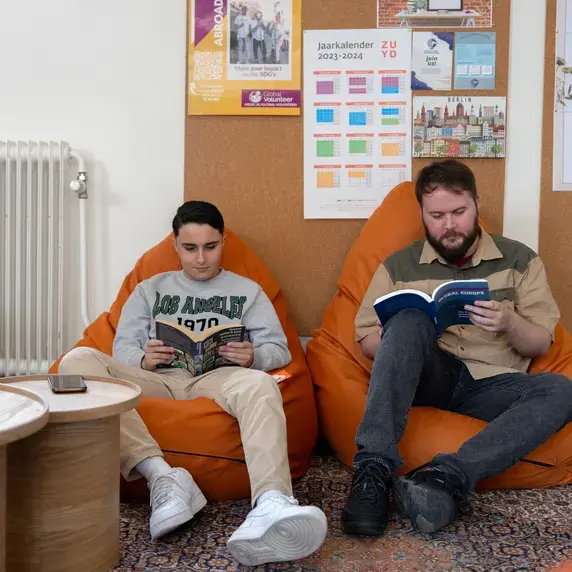
Try it out with an Experience Day
Looking forward to studying European Studies? Join us for an Experience Day to see how we prepare our students to tackle the societal challenges Europe faces today. What can you expect?
- Meet the study: Learn how the programme is structured and hear first-hand from students about their experiences.
- European Knowledge lesson: Get an overview of recent developments in Europe and discover how they impact our daily lives.
- Work on a current project: Dive into a theme such as safety, sustainability, or inequality. You’ll receive an introduction to the project at the start of the day.
- Strategic communications: Learn how to communicate a message effectively and put it into practice right away in your project work.
- Collaboration and presentation: Work together in a group to come up with solutions, then present your ideas to the rest of the class.
- Tour and lunch: Explore our building, meet lecturers and students, and enjoy a tasty lunch together.
The Experience Day is designed for a group of up to 25 participants, just like a real class. Parents stay at home so you can truly experience what it’s like to be a European Studies student.
Practical information:
- The day runs from 10:00 to 15:00. Can't stay all day? No problem, but we recommend joining the full programme for the best experience.
- Our building is easily accessible by public transport. There’s a bus from the station that stops right at our door.
- For the project, it’s handy if you bring your laptop.
Taking part in an Experience Day is your chance to find out whether European Studies is the right fit for you. Many high schools offer the option of applying for a leave of absence to attend. Sign up and experience what it’s like to study in Maastricht!
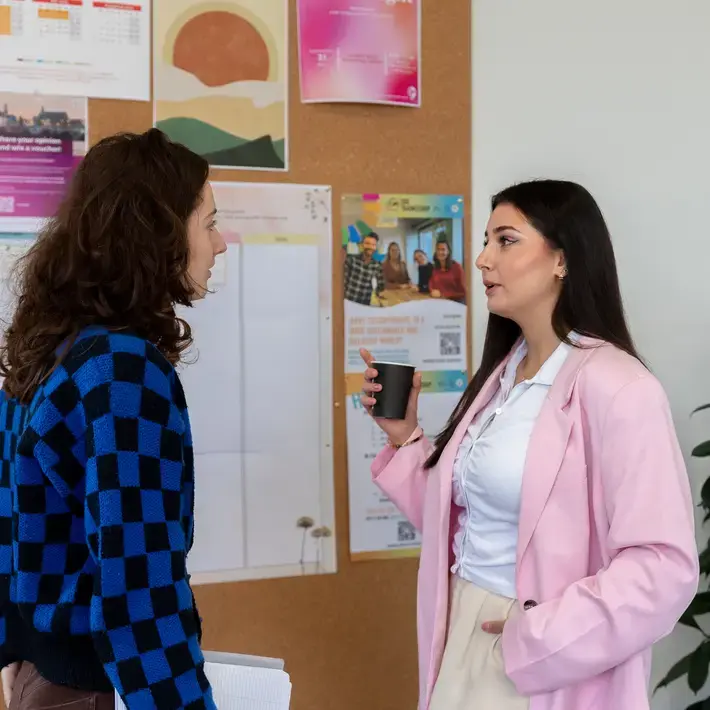
Visit the Open Day
Wondering if European Studies is right for you? An Open Day is the perfect way to find out! At the information market, you can chat with students and lecturers and ask all your questions. A short presentation will introduce you to the structure of the programme and what you can expect. There’s also a fun mini class about Europe, so you can see right away if the topics we cover spark your interest. Take a stroll through the corridors, soak up the atmosphere, and see for yourself whether you can picture studying here.
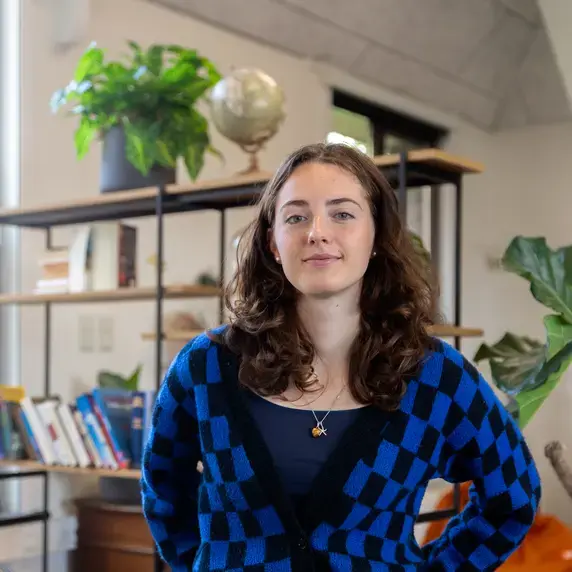
What Comes Next
You’ve finished European Studies, what’s next? Discover which careers you can pursue and what the job market opportunities are. Get an overview of further study options and read stories from alumni.
The best part is that the projects let you really apply what you learn.
The best part of European Studies is that the projects let you really apply what you learn. Working with an international team gives you confidence. It's the perfect preparation for your career. – Ana Tasheva
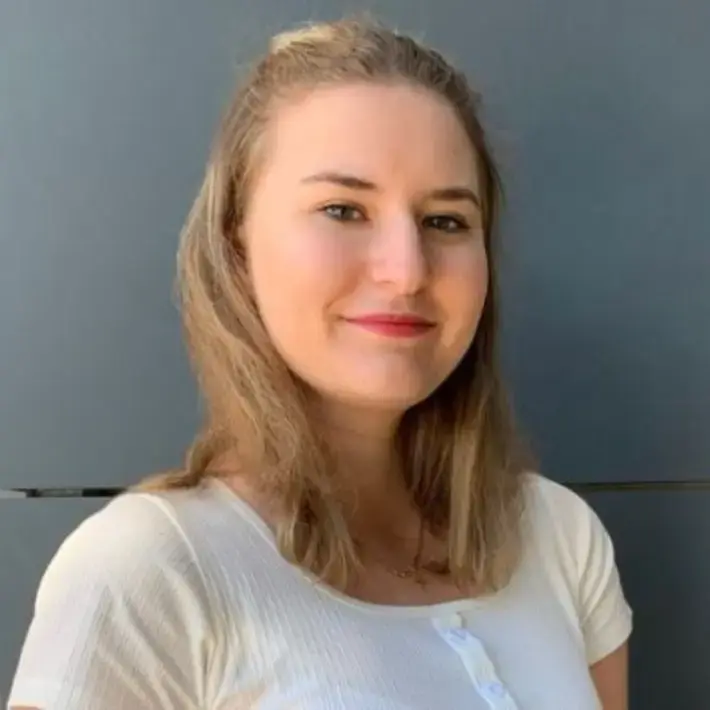
Your future
Professions
Job prospects and salary
By the time you graduate, you’ll already have experience working on real projects, the ability to collaborate across cultures, and the confidence to step into a professional role. You will receive an internationally recognized Bachelor’s degree that opens doors to both employment and further study, in the Netherlands and worldwide.
Salary
What you will earn after you graduate with your European Studies bachelor depends on the type of job, your experience, location, and type of organisation. For your first job, you can usually expect a salary between €2,300 and €3,000.
Continue studying
If you have completed your HBO bachelor European Studies, you could choose to go on and study for a master's degree. For example:
- International Relations
- Political Science
- European Studies
- Public Administration
- Law
- Communication and Information Sciences
By completing a pre-master’s minor, you can directly progress to the Master’s in European Studies at Maastricht University once you have finished your bachelor’s degree in European Studies.
Practical Information
Want to start European Studies? We’ll guide you step by step through the application process, admission requirements and the structure of the programme. You’ll also find out what to expect in terms of workload, costs and support.
Study load and study advice
The European Studies HBO programme is a full-time study, an average of 40 hours per week. Roughly half of that time is spent attending classes, and the other half working on group projects, preparing lessons, and studying independently. In each study block, you’ll take three tests: a language test, a knowledge test, and a project assessment.
Every study block is worth 15 credits (EC), adding up to 60 credits per year and a total of 240 credits over four years. Step by step, you’ll work towards your degree. We design your schedule efficiently, so you’ll sometimes have free parts of the day. This gives you time to work on projects, have a side job, or enjoy fun activities with friends, helping you find a healthy balance between your studies and student life.
You can register for our bachelor in European Studies through Studielink. When you apply, you’ll also select your language option and starting level. Not sure yet? Don’t worry, you can still change your language choice before the programme begins.
Do you still have questions or want to check in a personal meeting whether this course really suits you? Contact Linda Brouwers. She’s your go-to person for any questions, even via WhatsApp.
How to apply
Want to start European Studies? Great! Some programmes have additional admission requirements, so check these in advance. After you apply, we’ll invite you for a study choice check to make sure the programme is the right fit for you, so you can start well prepared.
Tuition fees
As a degree-seeking student you will have to pay annual tuition fees. Students from the EU pay the statutory tuition fees, and non-EU students pay the institutional tuition fees. Normally speaking, these fees are waived for exchange students from partner universities.
Education and examination regulations
The education and examination regulations (EER) provide all the information you will need about the content of the study programme, the academic support provided, and the way in which examinations are organized.
Study in the Netherlands
Career-Focused Learning at Zuyd University of Applied Sciences
European Studies at Zuyd combines academic knowledge with real-world experience to prepare you for the international job market. Unlike traditional research universities, Universities of Applied Sciences focus on professional practice. From the start, you’ll work in small, international teams on real projects for organisations like Amnesty International, Interreg and KLM.
You’ll develop practical skills in areas such as communication, policy advice and intercultural collaboration—guided by dedicated supervisors. Each term, you take on a different professional role, helping you discover what suits you best.
By the time you graduate with a European Studies degree, you’ll already have hands-on experience, a strong professional profile, and an internationally recognised degree that opens doors across Europe and beyond.
Nationalities of our students
Diversity is one of the defining strengths of the European Studies programme. With students currently representing more than 30 nationalities, our community is truly international. This multicultural environment prepares students for international cooperation and careers. It also creates a dynamic classroom experience where global perspectives are shared and valued. Our teaching staff is equally diverse, fostering an inclusive and welcoming atmosphere.
Housing
Zuyd works with trusted partners to support international students. MyMaastricht is an official partner offering reliable, English-language information on housing, healthcare, transport, and more, everything you need to prepare for life in Maastricht.
For housing, we collaborate with MaastrichtHousing, our official housing platform, providing safe and affordable accommodation options for students.
Want to know more about housing? Check our housing page for details.
Lecturers
The teaching staff at European Studies brings a wealth of academic and professional experience. Most of our teaching staff hold a Master’s degree or PhD in their field, ensuring you receive a strong academic foundation. Before joining Zuyd University of Applied Sciences, our lecturers worked in areas such as diplomacy, international relations, policy advising, strategic communication, and more. This blend of academic knowledge and hands-on experience brings your learning to life, connecting theory directly to real-world practice.
To stay current with the latest developments in European policy and international affairs, several of our European Studies lecturers also continue to work part-time in external professional roles.
Study load and study advice
Study load and study advice
The European Studies HBO programme is a full-time study, an average of 40 hours per week. Roughly half of that time is spent attending classes, and the other half working on group projects, preparing lessons, and studying independently. In each study block, you’ll take three tests: a language test, a knowledge test, and a project assessment.
Every study block is worth 15 credits (EC), adding up to 60 credits per year and a total of 240 credits over four years. Step by step, you’ll work towards your degree. We design your schedule efficiently, so you’ll sometimes have free parts of the day. This gives you time to work on projects, have a side job, or enjoy fun activities with friends, helping you find a healthy balance between your studies and student life.
You can register for our bachelor in European Studies through Studielink. When you apply, you’ll also select your language option and starting level. Not sure yet? Don’t worry, you can still change your language choice before the programme begins.
Do you still have questions or want to check in a personal meeting whether this course really suits you? Contact Linda Brouwers. She’s your go-to person for any questions, even via WhatsApp.
Application
How to apply
Want to start European Studies? Great! Some programmes have additional admission requirements, so check these in advance. After you apply, we’ll invite you for a study choice check to make sure the programme is the right fit for you, so you can start well prepared.
Tuition fees
Tuition fees
As a degree-seeking student you will have to pay annual tuition fees. Students from the EU pay the statutory tuition fees, and non-EU students pay the institutional tuition fees. Normally speaking, these fees are waived for exchange students from partner universities.
Education and examination regulations
Education and examination regulations
The education and examination regulations (EER) provide all the information you will need about the content of the study programme, the academic support provided, and the way in which examinations are organized.
Study in the Netherlands
Study in the Netherlands
Career-Focused Learning at Zuyd University of Applied Sciences
European Studies at Zuyd combines academic knowledge with real-world experience to prepare you for the international job market. Unlike traditional research universities, Universities of Applied Sciences focus on professional practice. From the start, you’ll work in small, international teams on real projects for organisations like Amnesty International, Interreg and KLM.
You’ll develop practical skills in areas such as communication, policy advice and intercultural collaboration—guided by dedicated supervisors. Each term, you take on a different professional role, helping you discover what suits you best.
By the time you graduate with a European Studies degree, you’ll already have hands-on experience, a strong professional profile, and an internationally recognised degree that opens doors across Europe and beyond.
Nationalities of our students
Diversity is one of the defining strengths of the European Studies programme. With students currently representing more than 30 nationalities, our community is truly international. This multicultural environment prepares students for international cooperation and careers. It also creates a dynamic classroom experience where global perspectives are shared and valued. Our teaching staff is equally diverse, fostering an inclusive and welcoming atmosphere.
Housing
Zuyd works with trusted partners to support international students. MyMaastricht is an official partner offering reliable, English-language information on housing, healthcare, transport, and more, everything you need to prepare for life in Maastricht.
For housing, we collaborate with MaastrichtHousing, our official housing platform, providing safe and affordable accommodation options for students.
Want to know more about housing? Check our housing page for details.
Lecturers
Lecturers
The teaching staff at European Studies brings a wealth of academic and professional experience. Most of our teaching staff hold a Master’s degree or PhD in their field, ensuring you receive a strong academic foundation. Before joining Zuyd University of Applied Sciences, our lecturers worked in areas such as diplomacy, international relations, policy advising, strategic communication, and more. This blend of academic knowledge and hands-on experience brings your learning to life, connecting theory directly to real-world practice.
To stay current with the latest developments in European policy and international affairs, several of our European Studies lecturers also continue to work part-time in external professional roles.
Admission requirements
Non-Dutch
Generally speaking, a secondary school diploma will give access to our study programme, e.g.:
- Abitur
- Fachhochschulreife
- International baccalaureate
Extra requirement
Prove of a good command of the English language. A secondary school graduation level is required for EU-students. Students from outside of the EU are required to take an IELTS (score at least 6) or TOEFL test (computer-based score at least 213). Please note that your test results must be valid at the start of the programme. TOEFL and IELTS scores expire after 2 years. Cambridge certificates are valid indefinitely.
Immigration regulations
Don't forget to check the immigration regulations imposed by the Dutch authorities. Depending on your nationality, you may need to apply for a visa (MVV) for The Netherlands. This can be a time-consuming and expensive process; start your application process well in advance to avoid disappointment.
Deadline for application
Applications for enrolment in the European Studies course should be in our possession before the deadline. They differ for EU- and non-EU students:
- EU students: 1st July
- Non-EU students: 1st June
Diploma recognition
In co-operation with the NUFFIC, The Dutch Organisation for Internationalisation in Education, we will assess the value of foreign diplomas. Information on recognition of diplomas for admission to Dutch universities of applied sciences can be found on the NUFFIC website.
Havo
All profiles are accepted for admission.
Vwo
All profiles are accepted for admission.
Mbo
You can be admitted to the European Studies bachelor’s programme with an mbo level 4 diploma. Preferably, you have also completed English at level 4.
21+
Exemption of the pre-university requirements is only possible on the basis of a binding admission examination. You are only eligible for this examination if you are 21 years of age or older. For more information, you can send an email to europeanstudies@zuyd.nl.
Join our Open Day
Ask all your questions, soak up the atmosphere and experience what it’s like to study here. Whether you already know what you want or are still deciding, discover what truly suits you during the open day.
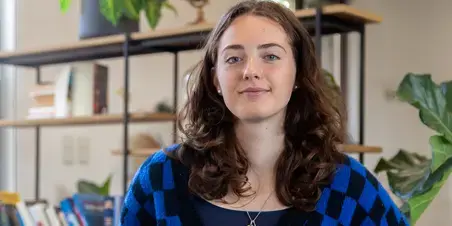
Explore from home
Join one of our online info sessions and get a good first impression of our programme – all in just 30 minutes.
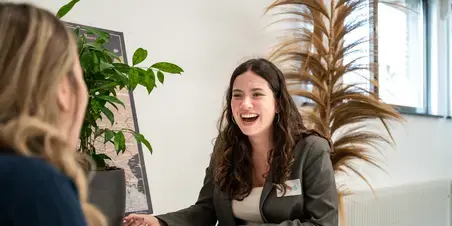
Download the programme brochure
Everything about the programme content, admission, internships and future opportunities, all in one clear document.
